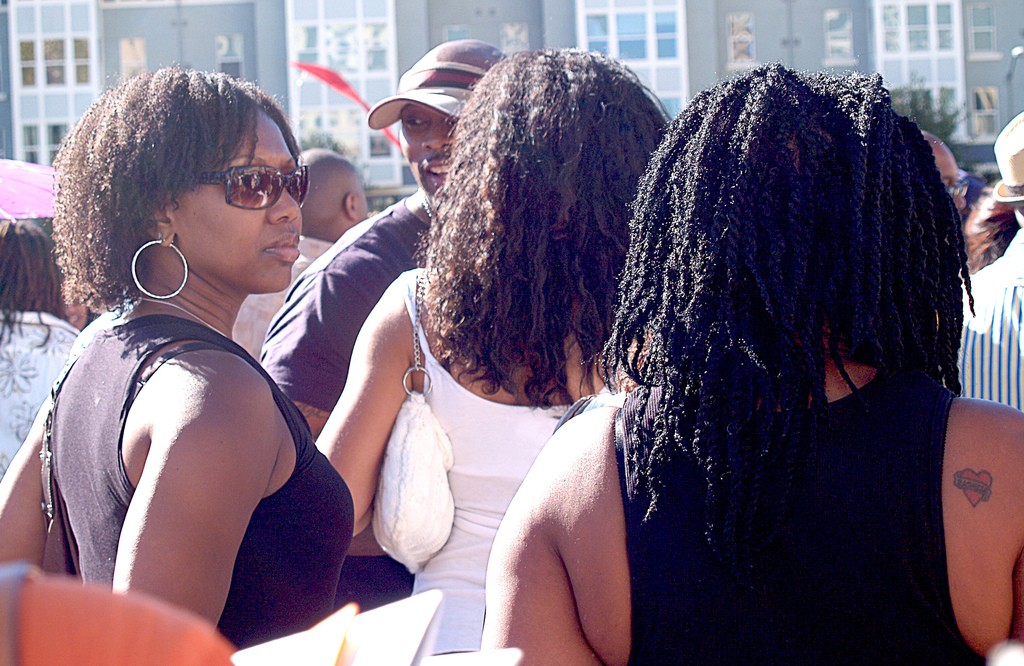Recently there has been a resurgence across the country of African-American women feeling liberated after putting down the “creamy crack,” or relaxers, and no longer being tied to the “chains” of hair appointments every three to six weeks. More important, this is their voice in the “New Civil Rights Movement” — they feel free from the oppressive stereotypes that “society” has placed on them because of their hair.
Historically, African-American women went through the arduous process of applying relaxers to their hair to feel
Daeja, who describes her own skin complexion as mahogany brown, says the image that comes to mind when she hears the phrase “nappy hair” is of someone who is “loud, has long, neon-colored, acrylic
She uses her hair as a conversation piece when approached by people of non-African-American descent. “I am defined by my hair — it’s what makes me — it’s a part of me,”
When asked what this movement is, she replies, “It’s the natural hair movement; the Black Lives Matter movement. It’s being natural. It's 'us.' Straightening our hair was so that we could be like white women in order to be accepted by society. I am proud to be black, and overall it doesn’t matter what category I’m in [good hair or bad hair], because they still know I am black, and I’m proud of that.”
Nakia Dedner, an assistant director of campus life and student support services, recalls her transition from chemically relaxed to natural hair as "experimental."
"I remember literally sitting behind this lady at church and being enamored with her curls!" she says. "I was shocked to learn that she was natural, and keep in mind this was back in 2008 when being natural was not popular."
She quickly learned that African-American women who have chosen to pursue this journey often face many issues when seeking products that will support the multiple textures of hair their genetics produce. So she decided to make her own natural hair-care products, designed specifically for women of color who have trouble finding products to support their hair before, during and after their transition. Her line of products, Nakia Amour, can be found for purchase at Whole Foods stores and her website, Nakiaamour.com.
Across town, a former City of Houston Municipal Court judge has similar remarks regarding her hair. “I find it very liberating because my hair is not an issue — it takes the power away from them,” she says.
Most times African-American women are asked if they feel like their hair is less aesthetically appealing in its “natural state.” To which the judge, who asked not to be identified by name, emphatically responded, “Honey, I know it is beautiful!”
She recalls the first time, more than 15 years ago, that she let go of the relaxer and the flat iron as “feeling free, black and over 21.” Her only regret, she adds, is she "wishes she would have done it sooner." The judge laughs and recalls the first time a woman who was not of African-American descent asked to touch her hair as being “odd."
“The first comment after touching [my hair] was, 'It’s so soft,' she says. "It's almost as if she expected it to be hard and brittle.”
In a household of five girls, all of whom had different hair textures and skin complexions, they were known as the “chocolate rainbow,” she says. “Hair conversations growing up were not a real big deal. Our hair was pressed with a hot comb so that it was more manageable, but not because we were told it would be prettier.”
In her profession, being poised and polished is of the utmost importance; no one wants to hire an attorney to represent him or her in court who is not “well put together,” the judge notes. When asked about the responses she receives in court from other attorneys and judges, she replies, “I will say that in the last five to ten years in the courtroom, the shock has diminished somewhat when around the older white and black judges — it helps that they are seeing more and more women of color in the South wear their hair natural, so it’s not as shocking as it once was.
“Black women are no longer viewed as being militant with our hair natural, and more and more professional women of color are on board with this 'movement,'” the judge adds.
She is adamant about not feeling the need to “press her hair out" prior to going to trial, because, she says, “this is me and I don’t see the need for that.”
Like the judge, many African-American women around the country, but particularly in the South, are taking back the power they possess through the many different textures African-American hair presents. They are using their hair to voice their position in this movement some have called the New Civil Rights Movement. Most can agree that sometimes the silent protests can be the loudest.
When asked how she thwarts anyone who attempts to define her through her hair's texture, the judge refers to a verse from India.Arie's "I Am Not My Hair":
"I am not my hair
I am not this skin
I am not your expectations…"



